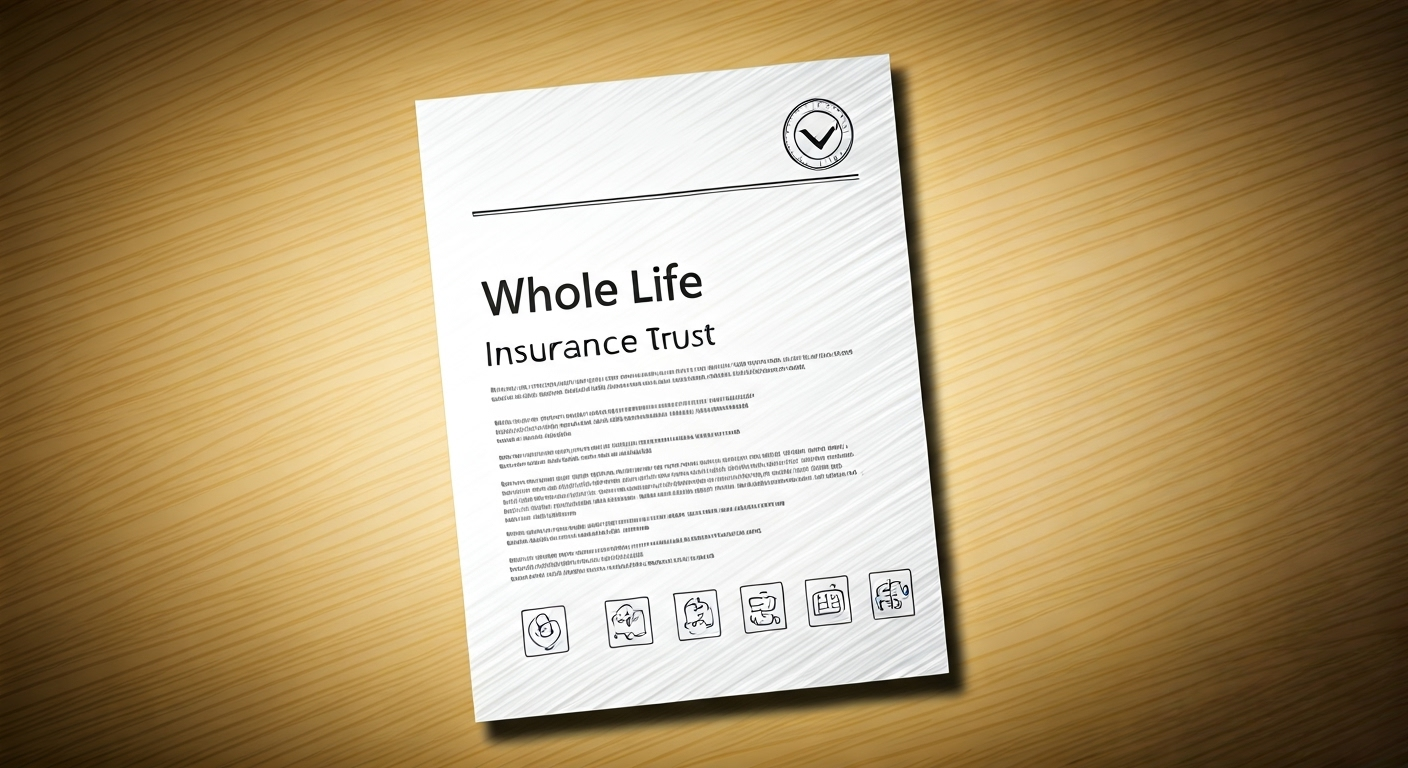
Key Highlights
- Whole life insurance policies are a permanent financial safety net, offering guaranteed death benefits to beneficiaries.
- A life insurance trust provides enhanced control over the distribution of assets and helps with estate planning.
- Trusts can exclude the death benefit from the grantor’s estate, potentially limiting estate tax implications.
- Establishing a life insurance trust lets policyholders secure their loved ones while mitigating legal and financial obstacles.
- With a life insurance policy placed into a trust, there’s an added layer of protection for beneficiaries, especially for those requiring special needs assistance.
Introduction
Whole life insurance is not just a policy. It can be a key piece of estate planning. With whole life insurance, your loved ones will get support and feel secure when you pass away, no matter when that is. If you add a life insurance trust to your plan, you build a legal way to help protect your assets, lower taxes, and also help guide where the insurance proceeds go. Putting life insurance with a life insurance trust can help make estate planning simple and help protect what you want to leave behind. This can also give you and your family peace of mind about the future.
What Is a Whole Life Insurance Trust?

Whole life insurance trusts are legal tools that help manage life insurance proceeds. They keep the money from whole life insurance out of the grantor’s estate. This can help with estate planning. The trusts help protect the death benefit, so it will be given out the way the grantor wants. This also helps the family avoid extra taxes and problems with the estate.
Whole life insurance trusts work differently than just owning an insurance policy by itself. They offer tax advantages and help with how the assets are divided. These trusts are good for people who have a large estate. That is because they help lower estate taxes and let you decide how your life insurance proceeds will be used by the people who get them.
Definition and Key Components
A life insurance trust is a legal agreement that helps manage the money from a life insurance policy. When you link this trust to a whole life insurance plan, it takes the policy out of the grantor’s estate. This gives privacy, helps with taxes, and lets you make a plan for how the money will be handed out.
There are a few main parts in trusts. The grantor is the one who makes the trust and gives up control over the policy. The trustee is in charge of looking after the assets in the trust. The beneficiaries are the people who get the insurance proceeds from the policy. These three parts help make the trust work and keep it legal.
The insurance policy is at the center of the trust. You have to pay the premiums on time while the person is alive. That’s how you make sure the money is there when they pass away. The trust agreement sets up how things will go. It makes sure the beneficiaries get what the grantor wanted them to have, following the rules they set out in the legal agreement.
How It Differs from Other Life Insurance Trusts
Whole life insurance trusts are not the same as other kinds of life insurance trusts, like term life or universal life insurance trusts. These differences matter a lot when it comes to estate planning.
| Trust Type | Features | Strengths |
|---|---|---|
| Whole Life Insurance Trust | This type gives permanent coverage for your whole life with a guaranteed death benefit. | It gives good, steady protection and long-term tax advantages. |
| Term Life Insurance Trust | This trust covers you only for a set time that the policy lists. | It costs less but is for short-term needs only. |
| Universal Life Insurance Trust | Here you get coverage for your lifetime and the chance to grow your money through investments. | Great for people who want both coverage and some growth as well. |
| Irrevocable Life Insurance Trust (ILIT) | The rules do not change after it starts; it gives the best shield against estate tax. | Perfect for those who want to keep their assets and lower taxes. |
Whole life insurance trusts do well because they give steady results and protection. They make sure beneficiaries get the proceeds of the policy as the grantor wants. These trusts really help in good estate planning by using tax advantages and giving peace of mind for you and your family.
How Whole Life Insurance Trusts Work

Whole life insurance trusts play a big role in estate planning. They help make sure the money from the insurance policy goes straight to who it should when the person who owns the policy passes away. The person who sets up the trust, called the grantor, pays the regular premiums so the insurance policy stays active. Once these payments are kept up, the trust holds the insurance policy on its own, not as a part of the grantor’s estate.
When it is time, the trustee gives out the money from the insurance policy as the grantor wanted. This setup helps the people who get the money get it in the way the grantor asked for. It can also help take away some estate tax problems. This is the reason many people use whole life insurance and estate planning with these kinds of trusts.
Setting Up the Trust in the United States
Setting up a whole life insurance trust in the United States needs good planning and a strong legal base. You start by making a trust agreement with help from an estate planner.
The grantor has to use a change of ownership form or other papers to move the insurance policy to the trust. After that, the trustees run the trust. They also hand out the money based on what the agreement says.
The insurance company is important here. It gives out the life insurance policies that fund the trust. With solid planning and help from professionals, a life insurance trust will protect your things and follow every law at each step.
Roles of Grantor, Trustee, and Beneficiaries
Three main jobs make up how a whole life insurance trust works:
- Grantor: This is the person who starts the life insurance trust. They put the life insurance policy into the trust. They also decide how to share the assets with others.
- Trustee: The grantor picks the trustee. This person makes sure the trust runs as agreed. They give out the insurance proceeds to the people named by the grantor. The trustee must be fair and careful with the trust’s assets.
- Beneficiaries: These people get money or other help from the trust. A life insurance beneficiary may be a family member, someone with special needs, or even a group.
This setup gives clear jobs to everyone. It protects the assets and explains how life insurance proceeds from the trust will go to the right people.
Benefits of Using a Whole Life Insurance Trust
Adding a life insurance trust that works with whole life insurance to your plan can give you many benefits. One key advantage is that life insurance proceeds are kept safe from estate taxes. You also get an easy way to control how insurance proceeds are handed out.
These tax savings help lower money worries, especially for people who have large estates. With this setup, you can make sure that your chosen people get the help that they need the most. Whether you want to protect what you have or choose how the insurance proceeds are handled, a life insurance trust with whole life insurance can make your plan stronger and more complete.
Estate Tax Advantages
Estate taxes can be a big problem for people who have estates with high value. A whole life insurance trust can give some relief here. Money from the death benefit of the life insurance is not counted in the grantor’s estate. This helps lower federal estate tax that needs to be paid.
This setup works by moving some assets out of the estate for tax reasons. For one, when the money from the insurance policy is paid, it does not get added into the estate total for tax. This lowers the amount hit by the tax.
These tax advantages are part of what makes whole life insurance trusts a good way to protect big estate values. They also help keep family wealth safe. This is why many people use a life insurance trust, a whole life policy, and the death benefit to plan for estate tax and federal estate tax.
Control Over Policy Proceeds and Distribution
Whole life insurance trusts help the grantor keep full control over how their policy money is handed out. The people chosen to get the money, the beneficiaries, can get the benefits just as the grantor wants. This means the plan works as the grantor set it up. A few good reasons to use these trusts include:
- The person in charge can hold off on giving a big payment at once. This can help keep the beneficiaries on programs like Medicaid.
- The money from the trust can be handed out in small amounts for things like paying for school or a place to live.
- The trust can set up a special plan to give out funds to people who have special needs.
The control given by these trusts lets grantors link life insurance or whole life insurance money with what their family might need after they are gone. It also helps stop others from using the money in the wrong way or from messing up someone’s help from the government. Insurance proceeds from a trust make it easier to keep everything on track and safe for everyone it is meant to help.
Potential Drawbacks and Considerations
While life insurance trusts, like whole life insurance trusts, offer a lot of value, there can be some challenges, too. Their legal agreement can cost a lot to set up, and the planning can be hard to do without a professional. You need someone with experience to get it right.
Also, some types of these trusts, like ILITs, cannot be changed or reversed once you make them. This means you lose some flexibility with your plans. Make sure you know about these problems, and think about what your estate needs before you decide. Check if the value and plans you have for your estate fit with this kind of trust—a structure that can protect what you have, but might also be a bit strict.
Limitations of Whole Life Insurance Trusts
Whole life insurance trusts come with many good things, but they are not the best choice for everyone. A big problem is how strict these trusts can be, especially if they cannot be changed. Once the trust is set up, it is hard for the grantor to look at new needs or change the whole life insurance policy.
If an estate might change over time, this can create tough planning problems. A revocable life insurance trust is more flexible, but it may not give the same tax advantages or protect from creditors as much.
It is a good idea to talk to a financial advisor when thinking about life insurance and estate planning. They can explain these limits and help find other ways that might work better for you.
Legal and Tax Implications to Consider
Legal details and tax implications need close attention when you set up life insurance trusts. Important papers like trust agreements should be done with help from an experienced estate planner. This is to make sure everything follows the rules.
When you create an irrevocable trust, there are key tax issues to think about. These include ways to avoid federal estate tax. But if the person who sets up the trust dies within three years after handing over the policy, the IRS could count those assets as part of the estate’s value.
Knowing about these life insurance rules and taking the right steps can help the process go well. It can also help you and your family avoid most legal trouble over your estate or estate tax.
Conclusion
To sum up, understanding Whole Life Insurance Trusts helps you make better choices about money. These trusts do more than give you estate tax advantages. They also let you control how the life insurance policy pays out and how your beneficiaries get the money. But, you have to watch out for some possible problems and the legal issues that come with setting up this kind of trust. If you think about the good and bad sides, you can figure out if this is the right way to go with your money plans. If you want to learn more or have any questions about whole life insurance or estate tax, please reach out. Your future with money is important, so take the time to plan and get help from an expert.
Frequently Asked Questions
Can whole life insurance be placed into a trust?
Yes, you can move a whole life insurance policy into a trust. To do this, you need to fill out a change of ownership form. You should also follow the trust agreement. This lets the life insurance policy become part of the life insurance trust. It helps to make sure the benefits go where you want them to.
What are the tax benefits of a whole life insurance trust?
Whole life insurance trusts help lower taxes, as they keep the death benefit out of the grantor’s estate. This means the value of the estate goes down, so there may be less to pay in federal estate tax. With these tax advantages, more of the assets can go to the people who are named as beneficiaries. There is no need for unwanted deductions, and things like whole life insurance can help protect what they will get.
Who should consider setting up a whole life insurance trust?
People who are doing a lot of estate planning or who have large estates should think about setting up these trusts. If you are someone who wants to protect assets for your family members, take care of those with special needs, or make life insurance policy payouts easier, these trusts can really help. They are good for people who want to plan for the future and help their loved ones.
With this kind of plan, your life insurance, insurance policy, and the rest of your estate planning can work together better for your family members.
Can I change beneficiaries after placing the policy in a trust?
Changes to who gets money or assets from an irrevocable trust are usually not allowed. This is because the trust works under set rules. The trust agreement says how things will be given out, and most of the time, the law does not let you make changes. Make sure your choices match your long-term estate goals.
What happens to the trust if I cancel my whole life insurance policy?
If you cancel the whole life insurance policy, the trust will lose its main funding. This can cause the trust to end, as written in the trust agreement. When this happens, assets might need to be looked at again or given out in a new way, based on the legal agreements and rules about life insurance or insurance policy.

